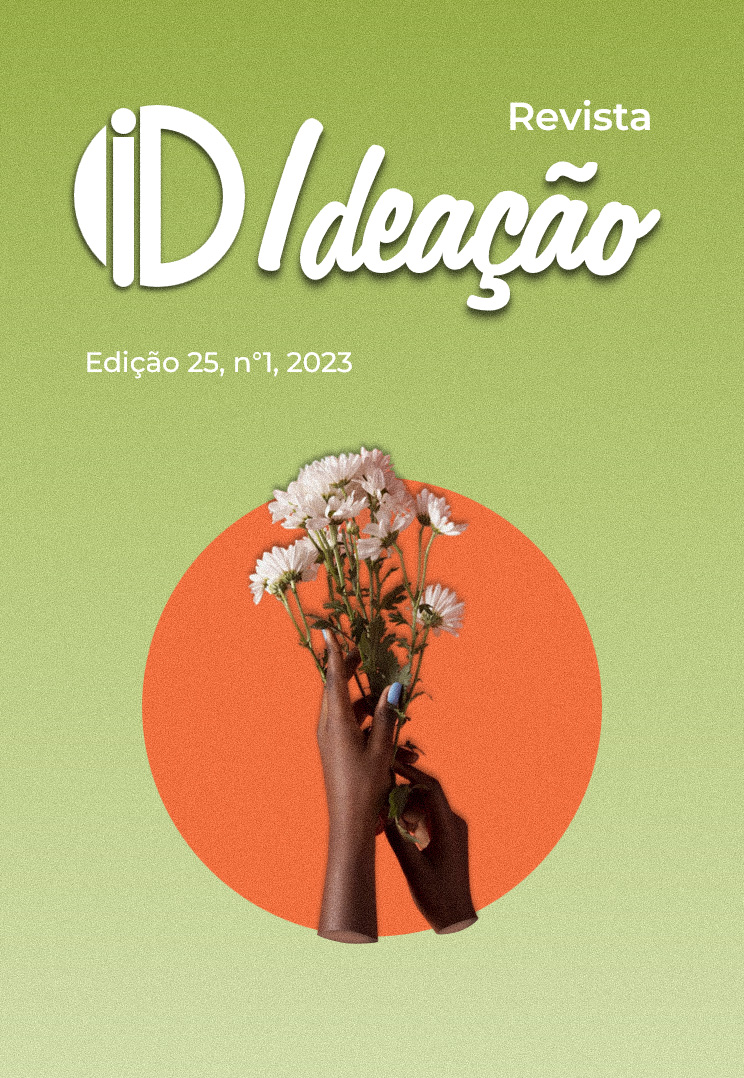Constituindo-se sujeito no país do outro
DOI:
https://doi.org/10.48075/ri.v25i1.29727Palavras-chave:
Identidade migrante, autonarrativa, memória, decolonialidade, estudos do discursoResumo
O artigo apresenta um estudo sobre representações do migrante pela perspectiva teórica discursiva e decolonial, partindo da autonarrativa de uma migrante beninense, estudante universitária no Brasil, como um modo de trazer à tona discursos silenciados de grupos minoritarizados, como o da migrante, e de conhecer um pouco sobre a identidade desse sujeito em deslocamento. Utilizaremos como dispositivo metodológico a Análise de Discurso de linha francesa, que estabelece a articulação entre materialidade linguística e história para a produção de sentidos. O corpus é constituído pois, de recortes discursivos da autonarrativa da migrante a partir da seleção de eixos temáticos que caracterizam regularidades, entre outras categorias de análise baseadas na semântica global de Dominique Maingueneau. O objetivo geral é analisar as representações identitárias que o sujeito tem de si e do outro brasileiro que emergem no discurso autonarrativo, a fim de discutir indícios da constituição subjetiva e identitária de quem fala e os processos de formação de memória que acontecem entre culturas e línguas. Para o uso da autonarrativa como possibilidade de construção de conhecimento, trazemos o estudo de Michel Foucault sobre a escrita de si, entre outros autores que falam sobre a importância das histórias de vida. Para fundamentar teoricamente as noções de memória, diferença e identidade, apoiamo-nos nos estudos culturais, além do olhar decolonial para lidar com as identidades subjugadas das minorias. Com essa reflexão, entendemos que é possível romper com o pensamento hegemônico único, eurocêntrico, que dá espaço enunciativo e relevância somente às narrativas dos povos privilegiados em detrimento do dominado, do sujeito colonizador em detrimento do colonizado, do sujeito hegemônico em detrimento do sujeito ordinário ou “infame” de que fala Foucault, valorizando, então, o lugar de fala de uma migrante negra e dando relevância à sua existência invisibilizada e silenciada no país hospedeiro, o qual, muitas vezes, lhe é hostil.
Downloads
Publicado
Como Citar
Edição
Seção
Licença
Copyright (c) 2022 Direitos partilhados conforme licença CC BY-NC-SA 4.0

Este trabalho está licenciado sob uma licença Creative Commons Attribution-NonCommercial-ShareAlike 4.0 International License.
Política para Periódicos de Acesso Livre
Autores que publicam nesta revista concordam com os seguintes termos:
1. Autores mantém os direitos autorais e concedem à revista o direito de primeira publicação, com o trabalho simultaneamente licenciado sob a Licença Creative Commons Attribution que permite o compartilhamento do trabalho com reconhecimento da autoria e publicação inicial nesta revista.
2. Autores têm autorização para assumir contratos adicionais separadamente, para distribuição não-exclusiva da versão do trabalho publicada nesta revista (ex.: publicar em repositório institucional ou como capítulo de livro), com reconhecimento de autoria e publicação inicial nesta revista.
3. Autores têm permissão e são estimulados a publicar e distribuir seu trabalho online (ex.: em repositórios institucionais ou na sua página pessoal) a qualquer ponto antes ou durante o processo editorial, já que isso pode gerar alterações produtivas, bem como aumentar o impacto e a citação do trabalho publicado (Veja O Efeito do Acesso Livre).
Licença Creative Commons
Esta obra está licenciada com uma Licença Creative Commons Atribuição-NãoComercial-CompartilhaIgual 4.0 Internacional, o que permite compartilhar, copiar, distribuir, exibir, reproduzir, a totalidade ou partes desde que não tenha objetivo comercial e sejam citados os autores e a fonte.


